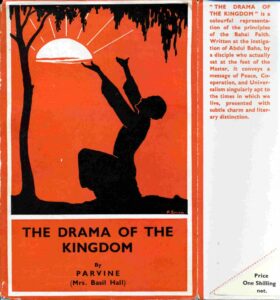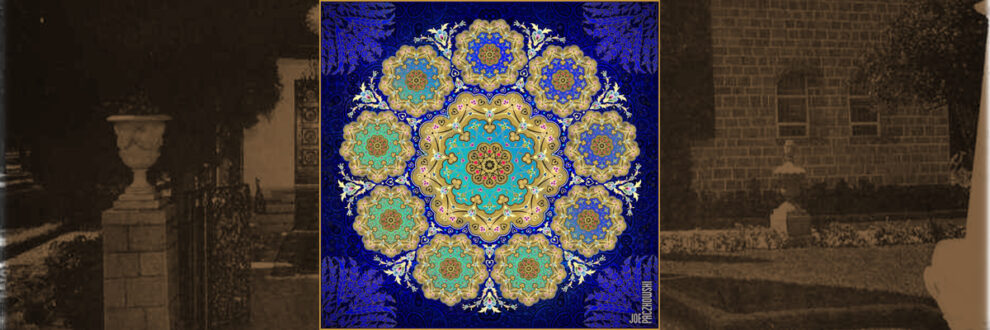 Mary Basil Hall aka Mary Blomfield aka Mary Esther Blomfield Hall
Mary Basil Hall aka Mary Blomfield aka Mary Esther Blomfield Hall
Born: January 14, 1888
Death: April 28, 1950
Place of Birth: Marylebone, England
Location of Death: London, England
Burial Location: Hampstead Municipal Cemetery, London, England
Mary Basil Hall had been given the name “Parvine” (a Persian name of a star) by `Abdu’l-Bahá.
Her parents Sara Louisa Blomfield and her father was a noted architect Sir Arthur Blomfield. Sir Blomfield was not a Bahá’í. She married Commander Basil William Reid Hall, son of Captain Basil Sidmouth de Ros Hall and Grace Reid, on February 9, 1920. Her married name became Hall[1]
She served as a member of the National Spiritual Assembly of the Bahá’ís of the British Isles for five years. It was partly due to Mrs. Hall’s generous bequest that the National Spiritual Assembly was able to buy what is now the national Bahá’í center at 27 Rutland Gate, London.[2]
The struggle for suffrage for women and amongst the early British Bahá’ís Women’s suffrage was an important issue. The best known from the Bahá’í point of view of the suffragists was Lady Sarah Blomfield. Both she and her daughters were involved with the WSPU. In 1914 as part of a mass protest against force-feeding of prisoners, Mary Blomfield (Mary Basil Hall) used her presentation at court to address the king; H. R. H. George V. Christabel Pankhurst describes it thus:
A deputation to the King did enter Buckingham Palace after all and the King heard our petition. The deputation consisted of one girl, Mary Blomfield, daughter of Sir Arthur Blomfield, a friend in his day of King Edward, and granddaughter of a Bishop of London. As Mary Blomfield, at her presentation at Court, came before the King, she dropped on her knee, with her sister Eleanor standing by her, and in a clear voice claimed votes for women and pleaded: ‘Your Majesty, stop forcible feeding.’[3]
Her sister, Sylvia also mentions the incident and refers to Lady Blomfield and her involvement with the Bahá’ís, neither of which seem to impress her overmuch. At a Court function afterwards, Mary Blomfield dropped on her knees before the King and cried “For God’s sake, Your Majesty, put a stop to forcible feeding!” She was hurried, as the Daily Mirror put it, from “the Presence,” which, so the public was relieved to learn, had remained serene. Lady Blomfield intimated to the Press her repudiation of what her daughter had done Lady Blomfield had been enthusiastic for militancy of the most extreme kind, so long as it was committed by other people’s daughters. She had come to me at a Kensington WSPU “At Home,” shortly after my release in 1913, expressing her delight that ‘Abdu’l-Bahá, of whom she was proud to call herself a follower, had spoken with sympathy of the Suffragettes; he had suffered forty years imprisonment, she told me ecstatically, for preaching the unity of all religions and the brotherhood of man. Under his teaching she had lost all regard for the pomps and vanities of earthly existence.[4]
Ann Boyles’ article Bahá’ís and the Arts: Language of the Heart gives this summary:
“In 1912 `Abdu’l-Bahá also gave an outline of a play, entitled Drama of the Kingdom, to Gabrielle Enthoven, a Bahá’í who was interested in drama. This original outline has been developed by several different writers over the years, beginning with Mary Basil Hall whose version was published in 1933. In 1994 an ambitious production, also based on this outline, premiered at the Nexus Theatre, Murdoch University, Perth, Australia, from 30 September to 3 October. Titled The Face of Glory: A Musical Rendezvous with the Soul, the original musical work involved a cast of 34 and an off-stage crew of twelve.”

At her passing the National Assembly cabled the Guardian:
“PARVINE GLORIED IN SUCCESS PLAN PASSED TO ABHA KINGDOM MORNING 28TH” (April 1950).
Source:
1 – Chisholm, Hugh, ed. (1911). “Blomfield, Sir Arthur William“. Encyclopædia Britannica. 4 (11th ed.). Cambridge University Press. p. 76.
2 – Memorial to a shining star London, United Kingdom, 10 August 2003 (BWNS)
3 – Christabel Pankhurst, Unshackled: The Story of How We Won the Vote (London: Cresset Women’s Voices, 1987), p. 277.
4 – E. Sylvia Pankhurst, The Suffragette Movement: AN Intimate Account of Persons and Ideals (London: Virago, 1977), p. 554.
5 – `Abdu’l-Bahá and Mary Basil Hall. “Drama of the Kingdom.” Bahai-Library.org: Winters, Jonah
6 – Youtube video Bahá’í Ireland
Images
© Bahá’í International Community
Book cover courtesy of Afnan Library
Image cover by Joe Paczkowski





Add Comment